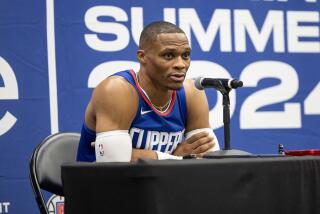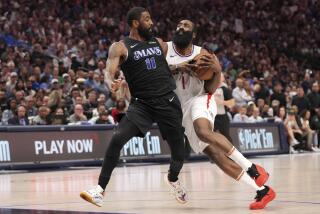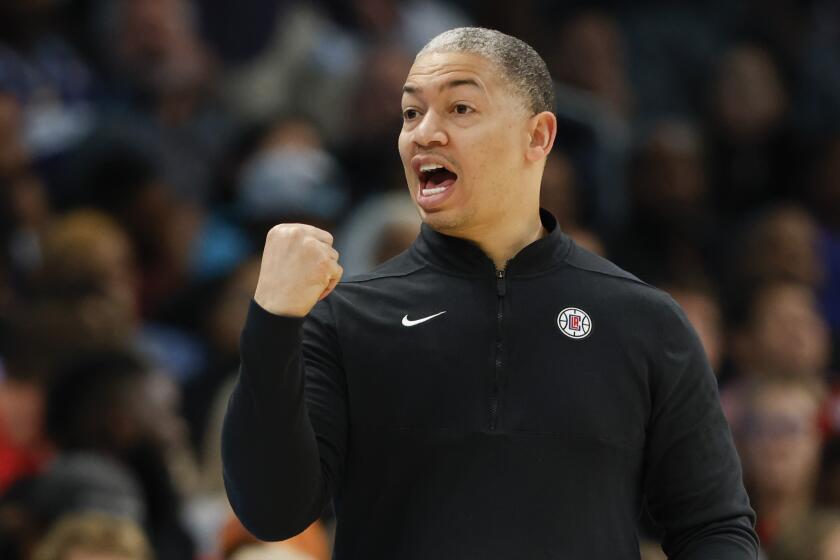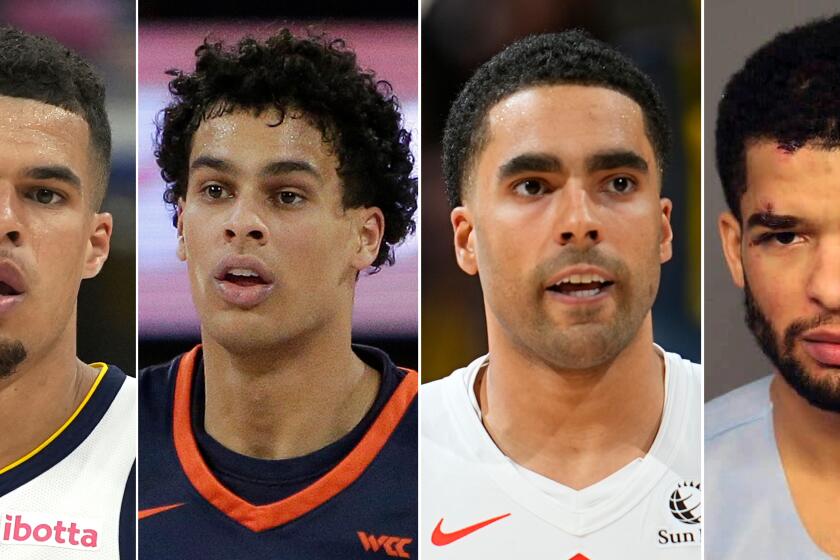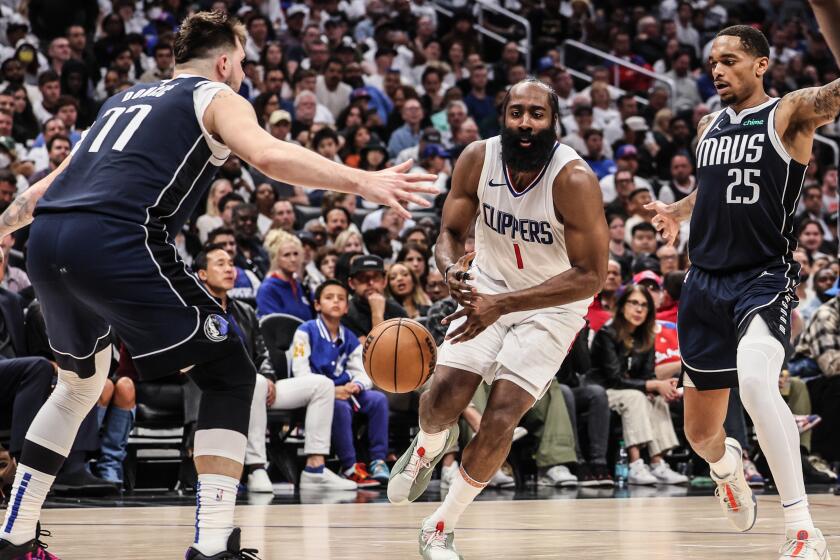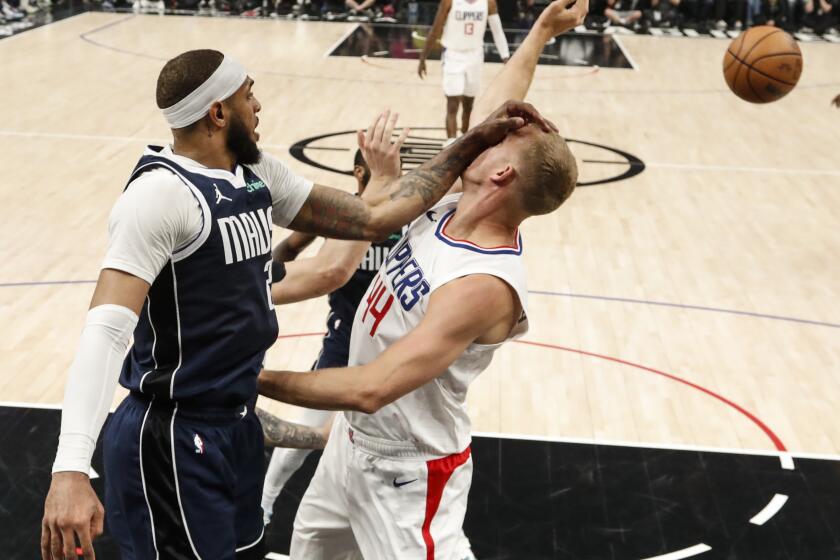COMMENTARY : Bullets Try a Fresh Approach
On a clear day, the Washington Bullets could walk out of the gym where they trained at Shepherd College, climb a few steps to the top of a ridge, and gaze at a spectacular view of the West Virginia countryside. Spread out before them as far as the eye could see: a lush forest just now blazing into color with fluorescent reds, yellows and oranges. The vantage point revealed a novel view for the Bullets, who’ve been rooted to the ground for so long, they’ve hardly ever seen the forest for the trees.
To get up where the air is rarified, Les Boulez have been dumping ballast. Since May, the Bullets have pushed David Wingate, A.J. English, Mark Alarie, Ledell Eackles and Andre Turner out the hatch; just the other day they jettisoned half of Bernard King’s salary. (If the Bullets chartered, they would look like the Flying Elvises in “Honeymoon In Vegas.”) But last week was their moral equivalent of Kitty Hawk, as they finally shoved John “Which Way To The Buffet Line?” Williams over the side -- all 317 pounds of him. To satisfy their LSU sumos, Williams and Stanley Roberts, the Clippers traded their Cybex for a Deep-Fry Baby.
Getting rid of Williams cleared the air at the Bullets’ training camp like industrial strength Glade. A collateral breath of fresh air was the hasty way the Boulez told the poisonous William Bedford: “Nice knowing you, hoss. Don’t let the door hit you on the way out.” Bedford wasn’t here long, but he made an impression. He arrived at practice with two earrings, and Wes Unseld -- not much of an accessories guy -- told him to take the earrings out. So the next day Bedford said to Wes, “You owe me $14. My earring holes closed up.” One can only imagine Wes’s counteroffer about reopening the holes.
Anyway, we move from who’s gone to who’s here, and chief among the names is Harvey Grant -- because he’s someone who wanted to be elsewhere. You’ll remember that in July, Grant signed an offer sheet with the New York Knickerbockers for six years and an eye-popping $17 million. It wasn’t just the money. Grant had never played in the playoffs, and he didn’t see Les Boulez getting there soon.
Indeed, at the end of last season, what Grant saw was: “Everyone in the league had gotten better, and it seemed we were at a standstill.” He had played four years in the league, and each year the Bullets had sunk further below .500. “I think playing on a winning team is very important to him,” said John Nash, the Bullets general manager. “I think he looks at his brother Horace and envies that situation; rightly so.”
They are twins, Harvey and Horace. But their pro careers have been separated at birth. Horace has never been out of the playoffs, and the past two seasons his Chicago Bulls -- okay, maybe not his Chicago Bulls -- have won the NBA title. “I wanted to play in New York because they’re a playoff team with a chance to make the championship,” Harvey said the other day after practice. “I get tired of people in airports coming up to me and saying, ‘Show me your rings, Horace.’ ... “
Harvey thought New York would give him his own rings and his own identity. He knew the Bullets could match the Knicks offer, but never expected that. “I was 100 percent sure they wouldn’t match,” Grant said. “Not for that kind of money. Maybe 10 or 11 million, but not 17.”
The irony is that one year ago the Bullets didn’t even have to go to 10 or 11 to sign Grant. Before negotiations broke off in October 1991, he was willing to sign a four-year deal with Washington for $6 million.
I remember fans debating whether Grant was worth this enormous outlay. My feeling was that had the Bullets abandoned a player of Grant’s profile -- solid 18-point scorer; good attitude; young, emerging star -- just for money, it would have destroyed the credibility of the franchise. I thought the Bullets needed to keep Harvey Grant to show fans they were serious about competing.
Because of the terms of the Knicks offer, though, Grant can walk away from Washington after two seasons, completely free to make his own deal. So you’ve got this dangerous combination of an escape clause and, perhaps, residual hostility from Grant. Yet Grant voluntarily reported to camp four days early. “I wanted to show the coaches that just because I got this money I won’t sit back on my rear end,” he said. “I wanted to help the young guys. And I wanted to show the fans I’m not a bad guy.”
Grant had a basketball in his right hand, and he held it in front of his face like a crystal ball. “We’re one or two players away now from being a good team. ... I mean, how committed are the Bullets to winning?”
More to Read
Get our high school sports newsletter
Prep Rally is devoted to the SoCal high school sports experience, bringing you scores, stories and a behind-the-scenes look at what makes prep sports so popular.
You may occasionally receive promotional content from the Los Angeles Times.
